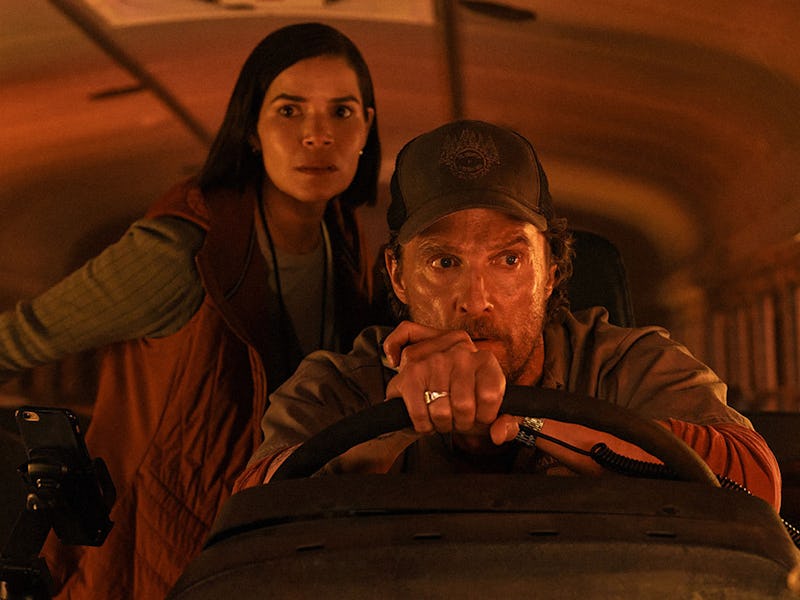The Lost Bus Tries Too Hard To Bring Back The Disaster Movie
This harrowing true story could have made a great action film, but too often does it veer off-course.

The disaster movie is an endangered species on the Hollywood food chain. Like the romantic comedy, it was once an apex predator, dominating the box office without much of a fight. Now it’s rare to see any getting the green light at all, much less doing well in theaters.
Maybe it’s because we’ve moved beyond fictional depictions of destruction: It feels redundant to bring up our real-life dystopia again and again, but do we really need to dramatize the state of the world any more than it already is? We don’t have to do more than scroll through social media (or, occasionally, look out the window) to see a disaster staring back. New films also don’t have to reach very far into the past to rip a harrowing story from the headlines, as The Lost Bus demonstrates, for both better and worse.
The Lost Bus follows an against-all-odds tale of survival during California’s deadliest fire in recorded history — not the Palisades Fire, which ravaged the state earlier in 2025, but the 2018 Camp Fire, which in a lot of ways still feels like too fresh a tragedy to depict. It doesn’t help that this film adaptation focuses less on the circumstances that caused the fire than on a handful of overwrought tropes designed to make us “feel” for its unsung heroes. The Lost Bus is skittish with certain elements of its true story (like, say, the role that climate change played in it) and overly indulgent with others. It’s more than capable of achieving disaster movie greatness, as it proves in fits and starts. But it’s so determined to hit the right emotional beats that it nearly skids off-course.
Matthew McConaughey’s unsuspecting lead, bus driver Kevin McKay, is already having what seems to be the worst week of his life before he’s called into the inferno. He’s not the type to do anything by the book, which lands him in hot water with his dispatcher (Ashlie Atkinson) at every turn. Then, there’s his precarious — and, admittedly, melodramatic — home life: Kevin is mourning the passing of a father he never truly knew, fretting over his aging mother, and squabbling with his ex-wife over the well-being of his son (who, in a particularly cringe-inducing scene, lets Kevin know how much he hates him). He’s doing everything he can to turn his life around from behind the wheel of Bus 963. But as constant check-ins over walkie-talkie and incessant phone calls reveal, he’s stuck in neutral, no matter how noble his intentions.
It’s almost a relief when The Lost Bus clicks into its second act, launching California’s Butte County into emergency mode. Errant sparks from a faulty transmission tower ignite the now-infamous fire, while record winds carry those embers through the brush at lightning speed. Before long, the forests surrounding Paradise, CA, are engulfed in flames, severing communication between Kevin and his Greek Chorus of dissenters and launching him fully into Hero Mode.
The Lost Bus is best when it focuses on actions, not words.
Director Paul Greengrass, the father of the shaky, handheld stylings of the Bourne franchise, puts his skills to great use here. His urgent, close-quarters style makes an effective shorthand as Kevin is dispatched to a nearby elementary school for a crucial rescue mission. He’s the last bus to return to base, making him the only bus available to pick up a group of children and their teacher, the quietly capable Mary (America Ferrera). This ragtag group is meant to rendezvous with their parents elsewhere — but as the fire rages, knocking viable options off the map, Kevin is forced to improvise, steering his bus and his charges deeper into hellfire.
Elsewhere, Cal Fire Battalion Chief Ray Martinez (Yul Vazquez) struggles to lead his firefighting forces through an increasingly dire situation. Not unlike Kevin, he’s stuck in one spot for the bulk of the film, but Greengrass ensures you feel every heated discussion and see every nervous drop of sweat. We’re in the trenches with each of these protagonists, watching helplessly as they fight what could easily be a losing battle. It’s all harrowing stuff — and unlike The Lost Bus’ heavy-handed script, Greengrass depicts it all with the gravity it deserves. At turns, his camera takes on the raging, unpredictable speed of the fire itself, weaving through brush and trees toward the untouched parts of Paradise. The Lost Bus is at its best when it’s tapped into the primal: the unstoppable force of this fire, the terror it incites, and what those caught in its crosshairs have to do to survive it.
McConaughey is similarly effective as Kevin: once upon a time, he was best known as the charming leading man with a fresh quip on the tip of his tongue. Here, though, he’s a man of few words, forced to make split-second decisions to get his passengers to safety. Watching the wheels turn is one of The Lost Bus’ simple pleasures; it makes all that set-up at the top of the film — and every graceless line that comes after it — feel all the more gratuitous. When it gets out of its own head, The Lost Bus is a competent, compelling action film. Its overreliance on disaster movie melodrama is nearly its undoing, though, showing us why this subgenre may be going extinct.